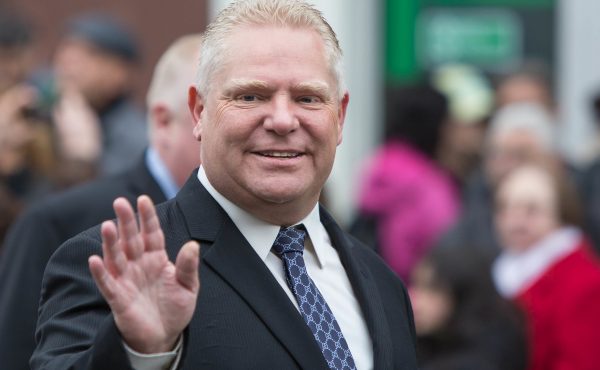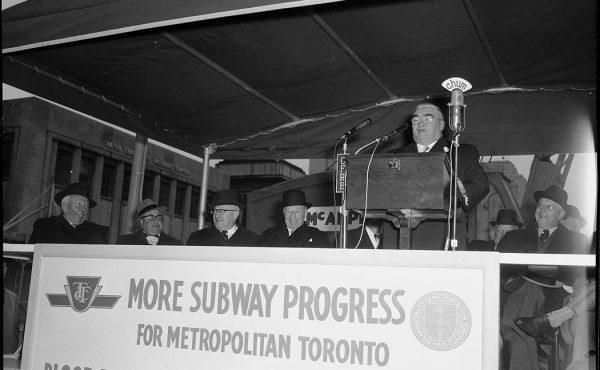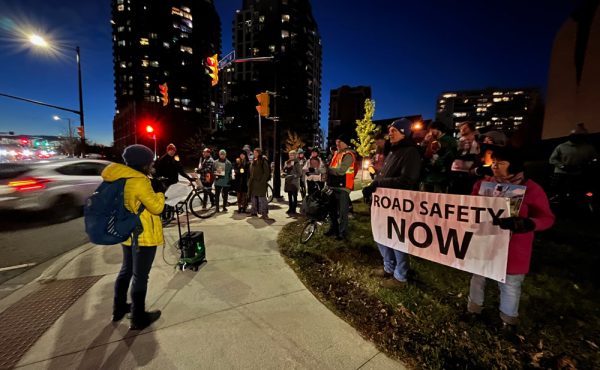
Dear Mr. and Mrs. Ford,
It has come to our attention that Rob and Doug are having some challenges with their course work, and specifically two classes: math and political science. Their teachers have observed that both boys seem blocked on basic questions, such as:
• “If you divide 45 by two, and round up to the nearest integer, is the answer greater or less than 25? Show your work.”
• “Please describe the two fundamental features of a minority government. Use examples to illustrate your answer.”
We strongly recommend that you seek out remedial help for both students as their term may be in jeopardy.
Yours, City Hall Guidance Department
![]()
Certain numbers have been thrown around since the TTC revealed late Friday afternoon that it will convene today for a (not so) in-camera session to set the terms and conditions of chief general manager Gary Webster’s be-heading.
For example, we know that five of the nine commissioners signed the petition requesting the meeting (and did so while chair Karen Stintz was on vacation), signaling that they can deploy the majority required to get their way.
We further (sort of) know the cost to the TTC – somewhere in the neighbourhood of $600,000 to $1 million – to make Webster go away, a figure that is roughly equivalent to the so-called savings the Ford administration found by cutting the mayor’s office budget and those of the 44 apparently irrelevant councillors who labour away on the second floor of City Hall.
Lastly, we know that eight of 11 Etobicoke/York community council members boldly sent a letter to Premier Dalton McGuinty, urging a free vote in the legislature on the $8.4 billion Metrolinx-TTC transit investment plan (Peter Milczyn, an ostensible Ford supporter, signed neither the petition nor the McGuinty letter).
But the only number that really matters from this moment on is 23 – the minimum number of votes required to achieve a council majority.
The simple truth is that the brothers Ford became, for all intents and purposes, a minority government on February 8, the day of the special council meeting. It’s just that they haven’t figured it out yet. Calculator anyone?
If the brothers need pointers on the differences between minorities and majorities, as well as some advice on how to transform the former into the latter, they would be well advised to contact family bud’ Jim Flaherty, to whom none of this is a mystery. Perhaps he can talk some sense into them; god knows no one else has.
Unless Frank DiGiorgio, one of the five commissioners who signed the petition, underwent some kind of mystical conversion over the weekend, it is safe to assume that Webster is gone – laughing all the way to the bank, his head held high.
Now let’s scroll forward to the make-or-break moment in early April when council gets its first look at the expert panel report on rapid transit options for Sheppard Avenue. But first, let’s try to travel into the minds of some of the individuals who are writing said study:
David Crombie: When he heard about the Webster coup, he may have found himself casting back to the period after he stepped into the mayor’s office in 1972 and found himself at loggerheads with some of the tough, old-school bureaucrats who saw his reform agenda as so much piffle. Crombie may not agree with the Fords’ tactics, but he likely has some insight into their frustrations.
Gordon Chong: When he learned the news, he may have glanced knowingly across the kitchen table at his partner, Shirley Hoy, who, lest we forget, served as the city’s chief administrative officer under diametrically opposed mayors (Mel Lastman and David Miller) and therefore knows a thing or two about the very real risks bureaucrats face when asked to provide dispassionate advice.
Bruce McCuaig (or designate): As the administrative head of Metrolinx and a veteran provincial civil servant, he finds himself surrounded on all sides by executives and board members with direct access to the premier’s office. So he knows a big something about implementing political orders.
An as-yet unnamed senior representative from the TTC: Fear of god, etc.
In short, it’s possible that the expert panel will recommend keeping the compromise proposal to extend the Sheppard subway to Victoria Park on life support, with follow up reports, etc. After all, these advisors are pragmatists with years of experience navigating the minefield separating bureaucrats and politicians.
But thanks to the expected Webster coup — and the cowardly way it has been handled — such findings may well be moot. The Fords, in the days since February 8, have done their utmost to dare the Stintz 25 (or has it grown to 26 or 27 since Friday?) to exercise their veto power for a second time, perhaps with added resolve. After all, the goodwill gestures made by Stintz and others during the special council meeting have been greeted with naked contempt. Absent new answers to the funding issue, there’s precious little incentive for them to mollify the mayor’s team.
What’s more, the Fordists’ perverse desire to thwart the will of council* and re-litigate the February 8 decision surely functions like a form of political superglue, not just binding together a coalition representing a range of perspectives and communities, but possibly adding a few wafflers who see the writing on the wall.
It’s always important to remember that the mayor’s obsession with blocking LRTs burns far more brightly than his professed love of subways. The irony is that by behaving like an arrogant majority government, the brothers may well deliver what they most despise (a Sheppard LRT) to the Scarborough voters whose interests they claim to represent.
And that, Mr. Mayor, is what 23 equals.
photo by George Heo
_______________
* Procedural By-law: s. 27-10 “Unless the procedures by-law specifies otherwise, a matter passes when a majority of members present vote for it.”





9 comments
I think the Ford’s actions of contempt towards council mean that the majority of council might deem it time to exercise it’s power to not only realign the TTC commission by a special meeting but also consider stripping the mayor of most of his powers not in the City of Toronto Act and change the bylaws. As Steve Munro said “It is my fervent hope that this whole debacle will force Council to strip the mayor of every power he might have that is granted by Council, not by the City of Toronto Act (most powers are in Bylaws, not in COTA). He can cut the occasional ribbon and spend a lot of time at the family cottage.” see http://stevemunro.ca/?p=6038 and ensuing comments.
Not all that familiar with the governing legislation. Could a majority of council not simply vote to reconstitute the TTC board?
…the very real risks bureaucrats face when asked to provide dispassionate advice…
Not just this, but as a P.Eng., Webster is professionally prohibited from fudging numbers or making misleading recommendations to suit political whims. My experience with P.Eng. folks (I am not an engineer) is that they take this very seriously.
A non-engineering analogy would be the case of a doctor who knowingly operates on a patient who does not need surgery, or who submits to pressure to do so. This would be a clear case of misconduct that could cost him his medical license. A parallel situation holds for engineers.
Frank Di Giorgio only won 27% of the vote in the last election, so he’s the most vulnerable on this. Let’s flood his office with phone calls and emails.
councillor_digiorgio@toronto.ca
416-392-4066
In response to SOL: Yes, council can replace the TTC commissioners. It might be too late to stop the firing of Webster, but it could stop Ford from stacking the new commission with more stooges.
To claim that recommending subways on Sheppard would be professional misconduct is BS. Whether a subway is needed or not depends on projected employment and residential growth in the area and traffic congestion levels on the 401/arterial roads. It is incredibly difficult to predict these things 20 years from now. In all likelihood I think Toronto will grow a lot in the next 20 years and the Transit City proposal will obviously be inadequate. Under Transit City it would have required 4 transfers to go from Scarborough Centre to York U via the Sheppard LRT and subway which is insane.
Andrew,
it is quite plausible that a P.Eng could sincerely believe that most growth projection for 401 corridor is too low and subway will be required in foreseeable future. In which case for him/her to recommend subway is certainly not professional misconduct. But if Mr. Webster sincerely believes that the projection is correct and LRT is by far the better option (which appears to be the case here), then it would certainly be a professional misconduct for him to withhold his own profession judgement and follow the mayor’s direction. This is not BS.
Andrew, it’s also insane that it requires 2 walks and two transfers to get to my parents’ house in the ‘burbs. For Frick’s sake, why won’t Ford build me a subway right to it?
Going from Scarborough to York U., or any other travel across the entire city, should be a job for a regional transportation solution like GO, not subways or LRT. If the province invested properly in building the GO Train system, the TTC wouldn’t have to be distracted by the needs of long-distance commuters.